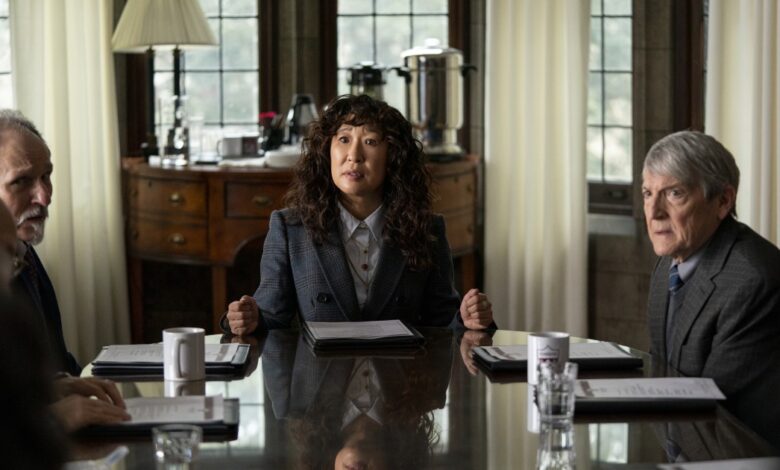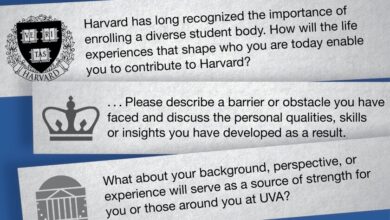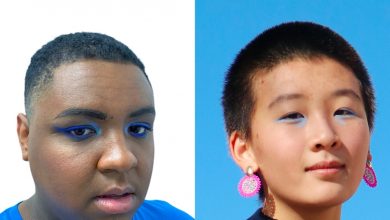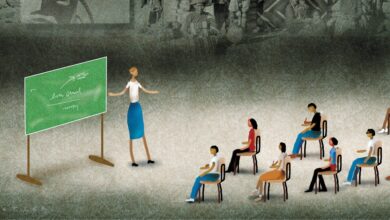Sandra Oh Wants You to Enjoy This Show

The Chair, a new television series that premieres on August 20 on Netflix, follows Professor Ji-Yoon Kim after she becomes the first woman and first woman of color to lead the English department at a prestigious liberal-arts college, the fictional Pembroke University, in New England.
It doesn’t go so hot.
Kim, played by the magnetic Sandra Oh, is determined to protect her ranks and steer the beleaguered department away from irrelevance. “I want to make you this promise,” Kim says at her inaugural faculty meeting. “I will not allow this department to be ransacked.” But she’s up against a cadre of dissatisfied older scholars, a dean whose highest priority is the balance sheet, and a student body that — when a professor and close friend of Kim’s makes a controversial gesture in the classroom — demands that he and the department be held accountable. Things go off the rails. “I feel like I arrived at the party after last call,” Kim says in one of the six episodes.
The series, which the actress Amanda Peet co-wrote and co-produced, is a dramedy. At one point, the actor David Duchovny makes a guest appearance, playing an egotistical version of himself, and tells Kim, “I don’t see color or ethnicity or even faces, at this point. I just see vibe and aura.”
But the series delves into serious topics, too, like the sticky nature of being the boss of your friends and what it’s like to be “the first” anything in an environment that thinks of itself as progressive but can be anything but. Oh, best known for her roles on the medical drama Grey’s Anatomy and the thriller Killing Eve, spoke recently over Zoom with The Chronicle about how she relates to Ji-Yoon Kim. This interview has been edited for length and clarity.
I want to ask you why you wanted to take on this role. I’d read that you come from a very academically minded family. At one point you said that you’re the only person in your family who doesn’t have a master’s degree in something. I was curious if that was part of the appeal in playing Ji-Yoon.
[Laughs.] I’ve got to tell you, it’s deeply satisfying when you can play these roles but don’t have to be them. You know what I mean? [Laughs.] My parents got a doctor, and now they’ve got a professor, who is another doctor. But yes, that is true. My family and my in-laws are very educated. I did not take that same path, because my path was strictly in the arts and in acting. But I’ve always wanted to go to university. I just pretend that I belong there. Amanda’s choice for this setting, I thought, was a very rich one, because without doing anything, you already have a generational gap. Particularly my position as coming into chair. She’s basically a manager. You already have tension because the character will never be able to satisfy anyone. And two, I love Amanda’s writing. I felt like I really understood her voice. I felt like I knew what she was trying to do. And I felt like I could do it.I read in the press materials for the show that you said that Ji-Yoon is one of the closest characters to yourself that you’ve ever played. In what ways are you alike or dissimilar?
Alike in ways of [long pause] an approach, similar in humor, and then similar in a deeper understanding of what it takes to make change. You see Ji-Yoon at the very beginning coming in hopeful and ready to shake things up and that she believes that she’s going to be able to make things happen for Yaz because she wants Professor McKay to get her tenure. [Yasmin McKay is a talented, untenured Black female professor in the department whom Ji-Yoon tries to support.] You just see her learn the difficulty of trying to make change within the institution. I think I feel close to that, in having a deeper, wider understanding of what it is to try and make change when you are in, you know, basically a white patriarchal system that doesn’t particularly include your point of view. That’s not necessarily Ji-Yoon’s. But I’ve felt that, in my career.
The university setting is ripe for these kinds of conflicts. You’ve got these people, and students, with soaring hopes, and they’re just agitating for change. Then you’ve got these very archaic institutions that are very bad at navigating change. I think that really comes through as a theme in the show, especially in Ji-Yoon’s conversations with Yaz. As the series goes along, Yaz doesn’t doubt Ji-Yoon’s intentions. But she also kind of sees Ji-Yoon as perhaps a cog in the greater academic system. I thought that was fascinating.
I’m so glad you picked up on that because there is a slight generational difference between Professor Kim and Professor McKay. From my point of view, having been young myself, a lot of the intentions of why I do what I do has not really changed. But if you’re able to continue on in whatever profession you want and you’re going to mature, your perspective to it will change. You just know more. So even though Yaz is saying things [complaining to Ji-Yoon about another professor, Elliot Rentz, who resents Yaz’s connection with her students] like “He’s only been ruling the profession for the past 40 years” … That is totally true, but when you get into those positions of leadership, it’s completely not black and white. And the way that you need to navigate keeping all the pieces together, and keeping all of them working, is a constant challenge.
In Ji-Yoon, you’re watching someone who’s highly competent, who has had a lot of professional success, navigate a situation in which she’s putting out all these little fires. She’s expected to be, at different times, a babysitter, a confidant, a taskmaster, a goal-setter. It’s the situation that puts up all these barriers in front of a very competent person, which I find so interesting to watch.
Yeah, and hopefully it’s deeply relatable. I don’t have Ji-Yoon’s life. My life as an artist is its own thing. But what I very much felt is that I don’t know how many women are doing exactly this. And it’s hard. It’s hard to keep moving forward, to just get through your day while you’re still trying to be a good-enough mother, daughter, boss, friend. It’s human. So when you see a human trying to navigate it, then hopefully the audience taps into their own humanity of, like, “I would have done the same mistake. I have been in the same situation.”
I also think that’s what makes for a fascinating show. The decisions that Ji-Yoon makes — it’s not like you can go back and look at it like, “Ooh, maybe don’t do that.” Everything makes sense in the moment—
Yes!
And yet it escalates. That’s so fascinating to me. In my experience reporting about higher ed, things just escalate sometimes, even when it involves people with the best or at least decent intentions, and things still kind of get out of hand or out of control.
Correct. Yes. Very quickly.
Yes, yes. Very quickly. I’m so curious if you had a perception of what faculty life was like before you filmed the show?
Not really. I will let you into this one secret that I found fascinating. Early on, we shot a lot of the stuff with all the professors, the entire department. And it so happened that all our guest actors knew each other. They were all acting teachers at different universities in Pittsburgh. I was like, “This is amazing.” It’s one of those, what’s that word? Not simpatico. What is it? When it’s kind of spontaneous and special and synchronistic? Where it’s like, “Oh, you guys are already professors, so you don’t have to do anything. You guys already have relationships with each other.” It’s those things that are great gifts.
In academe, people are hired into these positions as tenured professors and then they stay, sometimes for decades. You’ve got these long, intimate relationships with people in your department, for better or for worse. It can brew bad blood, or it can lead to incredibly close relationships. How do you go about establishing that kind of rapport and intimacy?
I gotta tell you, it was really hard shooting this show because it was at the height of the pandemic. We did it in Pittsburgh at the end of January, February, March of 2021. And so the vaccines had not come out yet. There was a lot of tension on set just because everyone was nervous and working through it. The things that you usually have as an actor to establish connection and relationship, we did not have because we don’t even have actors sitting beside each other. That’s how you bond. That’s how you create chemistry. But all the members of our company were so senior and high level. Everyone had so much skill. I felt everyone was just leaning in with the sharpest point of their instinct. So I remember at one point, Nana Mensah — she plays Professor McKay — she came in, and everyone’s in face shields and it’s the second day of shooting and it’s bananas. I had not met her. I had only seen her on Zoom. And Yaz and Ji-Yoon have a relationship. And it was like [Oh draws one finger back and forth between her face and the screen], “OK, just look at me. Just look at me. We’re just going to sit here.” And then we were able to create a certain type of intimacy.
There will be lots of women, women of color especially, in leadership roles who will be watching the show. There’s one quote from the trailer. What was it? “I feel like I’ve been given a ticking time bomb” —
— and they just wanted to make sure a woman was holding it when it went off.
Yes. That seems to have had a ton of resonance with people on Twitter. For those viewers, what do you hope that they get out of the show?
I just hope that they get a break from whatever they’re doing and that they enjoy it. If it’s something that they feel seen or represented in, that is bonus bonus bonus. Honestly, it’s just for people to enjoy. However it rolls out beyond that is really not in my control. I hope it does resonate in deeper ways for people.
If you had a college-age kid, would you want them to go to Pembroke?
I have nieces who are very near this age, you know, it’s interesting because — and they’re Canadian. My dad is pretty old school. It’s like [lowers her voice to imitate her dad], “I want to take you to lunch. I want to talk to you about your future,” with my niece who is, at this point, only 17. But she’s coming to it. He was like, “Go to an American school,” you know what I mean? He is very much from that thinking that going to an American Ivy League means X, Y, Z. Whatever the choice that my niece wants to make, I will support her. But I’ve also thought that there is so much pressure on kids and with the whole track of academia, there’s heavy belief systems around that that ultimately I don’t think are very good for certain kids. The heaviness of the expectation — and the heaviness of the belief that this is the only way through — I think is not productive, certainly not particularly creative. I think the setting itself is extremely creative. You just jam a bunch of kids together, something creative is going to happen. And the more diverse it is, the more you are meeting someone from Ghana and then someone from, you know, Seattle, and then someone from Toronto, and they all meet up in one university. That’s a great thing.
I do believe in education. I actually suggest it for young actors, where they are like, “What do I do? What do I want to do?” I say, “Go to theater school.” It’s not going to necessarily teach you to be a better actor. That’s not it. I went to the National Theatre School of Canada. My experience was that — and actually Ji-Yoon says this in some ways — it’s just this place for a moment, for three to four, potentially longer, years of a person’s life, where you should have the freedom to fail. You should have the freedom to try stuff. Because really that’s what they’re doing. Young people are trying to figure out how to be. This freedom is kind of unleashed. You’re also starting to recognize, potentially, belief systems and systems that are set up that you are really bristling against, that you need to try and figure out yourself. So the preciousness of the safety of exploration, I do believe in.
Source link






